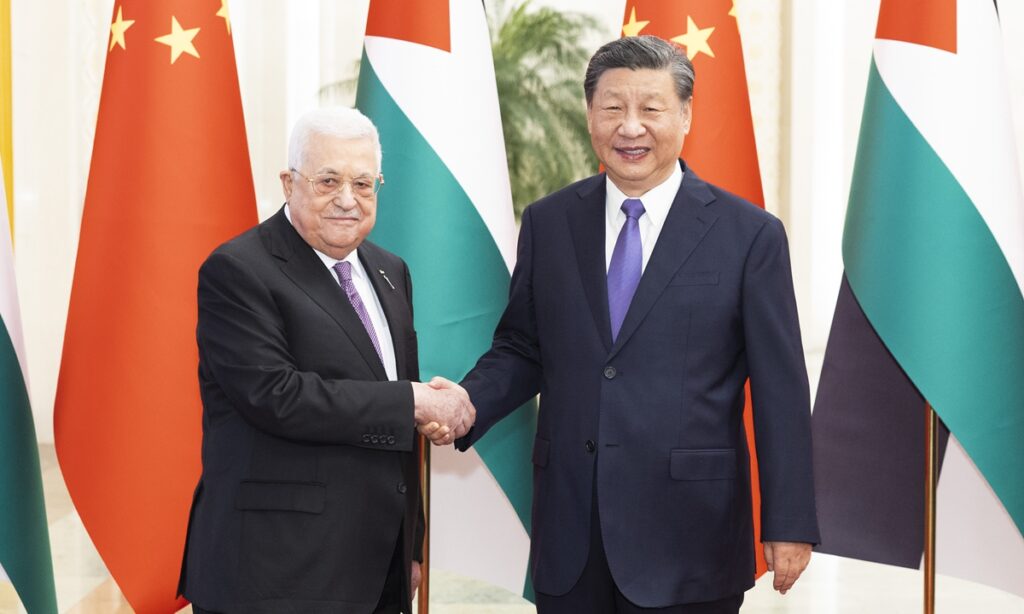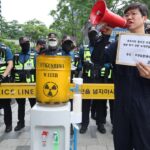Xi puts forward 3-point proposal to settle Palestinian question
China and Palestine on Wednesday upgraded their bilateral relations to a strategic partnership under the witness of Chinese President Xi Jinping and visiting Palestinian President Mahmoud Abbas.
Xi stressed that China and Palestine are good friends and good partners who trust and support each other. China was one of the first countries to recognize the Palestine Liberation Organization (PLO) and the State of Palestine, and has all along firmly supported the Palestinian people’s just cause of restoring their legitimate national rights, Xi said.
Facing unprecedented changes in the world and the new developments in the Middle East, China stands ready to strengthen coordination and cooperation with Palestine, and work for a comprehensive, just and durable solution to the Palestinian question at an early date, Xi noted.
Analysts said the significant meeting not only reaffirms the China-Palestine traditional friendship based on mutual trust and support, but also heralds China’s continuous commitment to addressing the Palestine-Israel conflict, which has been marginalized against the backdrop of major changes and turbulence in the global landscape despite recent mounting tension, analysts said on Wednesday.
Analysts believe that China, with a consistent and just stance, will continue playing a constructive role in promoting reconciliation in the Middle East, and they said that the China-proposed Global Security Initiative (GSI) is winning wider support and yielding more fruits in the region and worldwide.
Long-term friends
Noting that President Abbas is the first Arab head of state hosted by China this year, Xi said on Wednesday the visit speaks volumes about the strength of China-Palestine relations.
The upgrading of relations will serve as an important milestone in China-Palestine relations that builds on past achievements and heralds a brighter future. China will seize this opportunity to work with Palestine to advance bilateral friendship and cooperation in all areas, Xi said.
Since the establishment of bilateral diplomatic relations in 1988, China has always assisted within its capacity with Palestine’s economic development and improving people’s livelihoods.
China aided Palestine in the construction of more than 40 projects including schools and roads, sent expert teams, medical supplies and vaccines during the COVID-19 pandemic, and in June 2023, China pledged a further $1 million donation to the Relief and Works Agency for Palestine Refugees in the Near East.
In a joint statement on the upgrade of bilateral relations issued on Wednesday, the two sides reiterated mutual support on issues of core interests and key concerns.
Palestine upholds the one-China principle and supports all efforts made by the Chinese government to achieve national reunification… and condemns external interference in China’s internal affairs including Hong Kong and Xinjiang-related affairs.
China supports Palestine to become a full member of the UN and to resume peace talks with Israel on the basis of the principle of “land for peace,” relevant UN resolutions, and the “two-state solution” to achieve peaceful coexistence between Palestine and Israel.
The two sides vowed to actively promote negotiations on free trade agreements and enhance exchanges on culture, education and media. China will continue to provide humanitarian assistance to Palestine and support its livelihood and development projects and it will continue to provide personnel training and help with Palestine’s capacity building, read the joint statement.
Rong Ying, vice president of the China Institute of International Studies, told the Global Times on Wednesday that the upgrade in bilateral relations can usher in more potential for bilateral cooperation, thereby enhancing Palestine’s development and international presence.
China believes development can solve many security challenges in a sustainable way. China’s approach to mediation heralds China’s security and development outlook and its commitment to common, comprehensive, cooperative and sustainable security in the region, Rong said.
China approach
Xi, during the Wednesday meeting with Abbas, put forward a three-point proposal for the settlement of the Palestinian question.
First, the fundamental solution lies in the establishment of an independent state of Palestine that enjoys full sovereignty on the basis of the 1967 borders and with east Jerusalem as its capital. Second, Palestine’s economic and livelihood needs should be met. Third, it is important to keep to the right direction of peace talks.
A large-scale, more authoritative and more influential international peace conference should be convened to create conditions for the resumption of peace talks and contribute tangible efforts to help Palestine and Israel live in peace, Xi said.
When the Palestine question is being marginalized from the spotlight amid major turbulence in the global landscape, China has assumed the responsibility of a major power to continuously mediate the conflict. It maintains a consistent stance and moves forward step by step, Rong noted.
Ding Long, a professor at the Middle East Research Institute of Shanghai Foreign Studies University, told the Global Times Wednesday that China’s consistent stance, in contrast to certain major countries’ vacillating and partial positions, is the foundation of the high-level mutual trust between China and Palestine.
Wu Sike, former special envoy of the Chinese government on Middle East issues, noted on Wednesday that when mediating the conflict, China not only thinks from a bilateral perspective, but also cares for lasting stability in the region and acts out of international justice.
Long-term stability serves Israel’s interests because even if it can maintain an advantageous status for a while, as long as Palestine’s concerns are not addressed, conflicts will flare up every so often, jeopardizing Israel’s security and development, Wu told the Global Times.
China’s role and efforts have been recognized, as a recent poll showed that 80 percent of Palestinians welcome Chinese offers to mediate in the Palestine-Israel conflict, while the US is seen as the least favorite option.
The US, having been a broker in the Middle East for decades, cares most about its own influence and hegemony in the region, analysts said, citing the US’ “lip service” support for the “two-state solution” and Trump administration’s “Deal of the Century” plan based on the unconditional surrender of the Palestinians.
US partiality toward Israel has eroded its capability of communicating with Palestine while its policy flips-and-flops between different administrations have also frustrated the international community, they noted.
Li Weijian, vice president of the Chinese Association of Middle East Studies, told the Global Times that China’s mediation does not aim to immediately solve the issue, as it is far more profound and complicated than that between Saudi Arabia and Iran. The immediate goal is to bring the topic back to the spotlight, de-escalate tensions and end hostilities in order to push forward the resumption of peace talks that have been stalled since 2014.
Since China seeks no exclusive interests in the region, the US, if it is willing to do so, can also join the global efforts with its special ties with Israel, Li said.
Abbas Zaki, a Palestinian Fatah Central Committee member and commissioner for relations with Arab countries and China, told Xinhua in a Monday interview the Iran-Saudi Arabia rapprochement signaled a change in the political landscape in the Middle East and raised awareness of unity and independence among regional countries
When the Middle East is shifting its priority from geopolitics to development, China’s GSI, intertwined with Global Development Initiative and Global Civilization Initiative, is understood by more and getting wider support, Rong said. “China makes its contributions with Chinese proposals, solutions and wisdom,” he said.
(Global Times)




